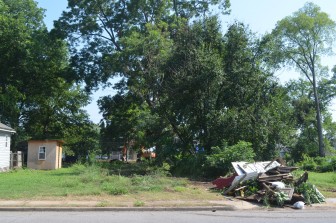Crime, Education, Jobs Among Top Issues For Birmingham Voters
Many people running for office in Birmingham, whether for mayor or city council or school board, have their own ideas about how to improve life in the city. But ask some of the city’s 212,000 residents what keeps them up at night, and you’ll hear the same concerns come up over and over again: jobs, education, and crime.
At a recent meeting of the Killough Springs Neighborhood Association in East Birmingham, dozens of people packed into the band room at Smith Middle School. Police Chief A.C. Roper was there to hear concerns about crime.
One woman told him about a man in her neighborhood recently firing a weapon.
“That man had a sawed-off shotgun, shooting into the ground,” she said. “What if one of those bullets had come in one of our homes?”
Roper took lots of time answering questions, but it just comes down to this, he says: “We’re having some challenges that are beyond the scope of the police department because some of the stuff that our kids are doing right now – we’ve got some issues.”
The city plans to spend $840,000 to expand its gunshot detection system, which tells police when and where weapons are fired. And more officers are walking the streets to build relationships with residents. But Roper says that’s not enough — residents have to make changes, too.
“We have a group of people walking our streets who have no regard for the lives of others,” he says. “That’s why if there’s a beef, they have no problem with pulling out their guns and shooting right there. They think a gun is the answer to all of life’s problems.”
Several candidates and residents say there’s a connection between crime, jobs, and quality of life in the city.
Pam Bates is executive director of the East Lake Initiative, a community development group. She says people want to be safe, and they also want to know “when they send their kids to school, will they graduate and be employable at that point.”
And she says people need jobs.
“We’ve got to increase economic development so people can be gainfully employed where they live,” she says.
Job growth has been slow in Birmingham, increasing less than a quarter of a percent in the last 15 years, according to a recent study commissioned by the Community Foundation of Birmingham and conducted by the Public Affairs Research Council of Alabama (PARCA). Unemployment is down, but about a third of Birmingham residents live in poverty.
Dora Sims is president of the Five Points West Community. Every day she watches as a commercial development with a hotel and restaurants takes shape next to the city’s CrossPlex athletic facility.
“We hope that development can really help to sustain our community and [it will] see a rebirth, not only within the business sector but in the residential sector,” she says.
And she wants some of the amenities that were once common on the west side and throughout the inner city, like restaurants and grocery stores.
“We’re looking for that quality of life where it’s just like it is on other sides of town,” Sims says. “You don’t have to leave your side of town to find places of enjoyment.”
The west side of Birmingham is densely populated, but there are also swaths that are vacant or overgrown with weeds. The City will invest about $3 million to clear abandoned lots in the coming months.
But one of the greatest challenges for Birmingham is its schools.
Emory Anthony is head of the Jefferson County Progressive Democratic Council, a political action group.
He says, “Birmingham is losing younger people with children because of the educational system. You’re going to have to turn the whole perception around that the Birmingham school system is a failing school system.”
Six of Birmingham’s seven high schools are on the state’s admittedly controversial failing schools list, and school enrollment has dropped 15 percent in the past five years.
City government contributes money to public schools, but it has little control over policy. Anthony says it will take city and school leaders working together to bring change.
Mideast clashes breach Olympic truce as athletes gather for Winter Paralympic Games
Fighting intensified in the Middle East during the Olympic truce, in effect through March 15. Flights are being disrupted as athletes and families converge on Italy for the Winter Paralympics.
A U.S. scholarship thrills a teacher in India. Then came the soul-crushing questions
She was thrilled to become the first teacher from a government-sponsored school in India to get a Fulbright exchange award to learn from U.S. schools. People asked two questions that clouded her joy.
Sunday Puzzle: Sandwiched
NPR's Ayesha Rascoe plays the puzzle with WXXI listener Jonathan Black and Weekend Edition Puzzlemaster Will Shortz.
U.S.-Israeli strikes in Iran continue into 2nd day, as the region faces turmoil
Israel said on Sunday it had launched more attacks on Iran, while the Iranian government continued strikes on Israel and on U.S. targets in Gulf states, Iraq and Jordan.
Trump warns Iran not to retaliate after Ayatollah Ali Khamenei is killed
The Iranian government has announced 40 days of mourning. The country's supreme leader was killed following an attack launched by the U.S. and Israel on Saturday against Iran.
Iran fires missiles at Israel and Gulf states after U.S.-Israeli strike kills Khamenei
Iran fired missiles at targets in Israel and Gulf Arab states Sunday after vowing massive retaliation for the killing of Supreme Leader Ayatollah Ali Khamenei by the United States and Israel.








